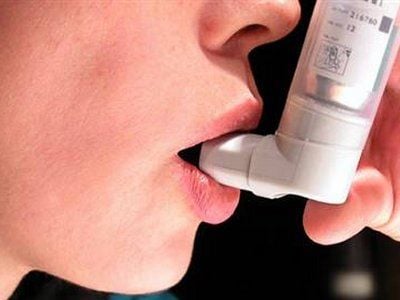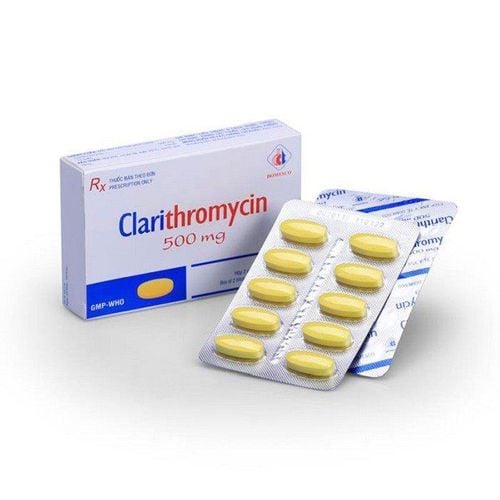The body naturally produces about 1 liter of mucus every day. Overproduction, especially in the lungs, can cause discomfort and be a warning sign of a health problem. According to a WHO report in February, more than 33% of people with coronavirus pneumonia have coughed up mucus.
1. Cautions when you have increased chest mucus
Your body naturally makes mucus daily to protect against infection. Therefore, finding mucus in your chest isn't always abnormal. Mucus, also called phlegm, is produced by the respiratory system, it is in tissues like the nose, mouth, throat, and lungs.
However, several medical problems show increased chest mucus, such as:
1.1. Acid reflux
If you have acid reflux, stomach acid moves up the esophagus and into your throat. This condition can irritate your throat after eating and cause postnasal drip, along with chest congestion.
1.2. Allergies
Allergies can lead to various symptoms, from itchy eyes and sneezing to nasal congestion, chest tightness, and coughing. If allergic to pollen or dust mites in the air, you'll often have lung-related reactions.
1.3. Asthma
Besides typical symptoms like dyspnea (shortness of breath) and chest tightness, asthma can cause you to cough up phlegm. This sign often shows your airways are inflamed. However, a small amount of white mucus is not concerning (normal).

1.4. Bacterial and viral infections
Infection conditions like the flu, acute bronchitis, and pneumonia can cause your respiratory system to produce more mucus, leading to coughing. The mucus may be unusually green or yellow.
1.5. Chronic obstructive pulmonary disease (COPD)
COPD includes lung problems like chronic bronchitis and emphysema, causing dyspnea. Chronic bronchitis inflames the bronchial tubes and stimulates mucus production, affecting lung function. COPD often develops after long-term exposure to irritants like cigarette smoke. People with asthma are also at risk of developing COPD.
1.6. Cystic fibrosis
This is a genetic disease causing mucus to develop thickly in the lungs and other organs. Cystic fibrosis can lead to decreased lung function as a person ages. Doctors often screen signs of cystic fibrosis in newborns, and 75% of cases are diagnosed by age two. Parents can pass on the cystic fibrosis gene even without showing symptoms. In the US, about 1,000 new cases are diagnosed each year.
2. Is Mucus a Sign of Coronavirus Pneumonia?

As widely reported, typical coronavirus pneumonia symptoms include fever, cough, and shortness of breath. However, additional symptoms are still being updated daily. Some patients show symptoms like a cold or flu; others have unusual or no symptoms.
According to the US Centers for Disease Control and Prevention (CDC), one or all symptoms can appear anytime within 2-14 days after a new strain of coronavirus exposure whose official name is SARS-CoV-2.
In February 2020, a World Health Organization (WHO) report showed that over 33% of patients coughed up phlegm-thick mucus from the lungs in 55,924 COVID-19 cases were follow-up. The COVID-19 cough isn't throat irritation or makes you feel itchy in your throat to clear. The dry cough always causes discomfort, starting from an inflamed sternum area and bronchial tubes. Patients feel it deep in their chest.
Generally, the novel coronavirus causing COVID-19 doesn't increase mucus production. But complications can include coronavirus pneumonia - a condition associated with chest congestion.
3. How to reduce mucus in the chest

To control or reduce mucus in the body, try these home remedies:
- Drink plenty of fluids: Drink plenty of water and other healthy liquids. Avoid dehydrating drinks like coffee and alcohol.
- Stay hydrated: Use a humidifier to make the air cool and moist or take a steamy shower to keep your airways moist.
- Don't smoke any type of cigarette: Cigarette or cannabis smoke irritates and increases mucus production.
- Use honey: Though honey doesn't remove mucus, a teaspoon can soothe a coughing episode temporarily (not for children under 1 year old).
- Check air filters: Irritants in the air can increase mucus production. Keep home heating and cooling system filters clean and replace them regularly.
- Use an expectorant: Some cough medicines containing guaifenesin help thin mucus, allowing you to cough it up.
Generally, mucus itself isn't alarming. But if mucus comes with a persistent cough for weeks, is yellow-green or bloody, or you also have fever or shortness of breath, see a doctor for advice. Many coronavirus pneumonia symptoms resemble common colds and flu. Carefully monitor your health and follow coronavirus precautions to protect yourself and your family.
For consultations and examinations at hospitals nationwide, please schedule an appointment on our website.
To arrange an appointment, please call the HOTLINE or make your reservation directly HERE. You may also download the MyVinmec app to schedule appointments faster and manage your reservations more conveniently.














